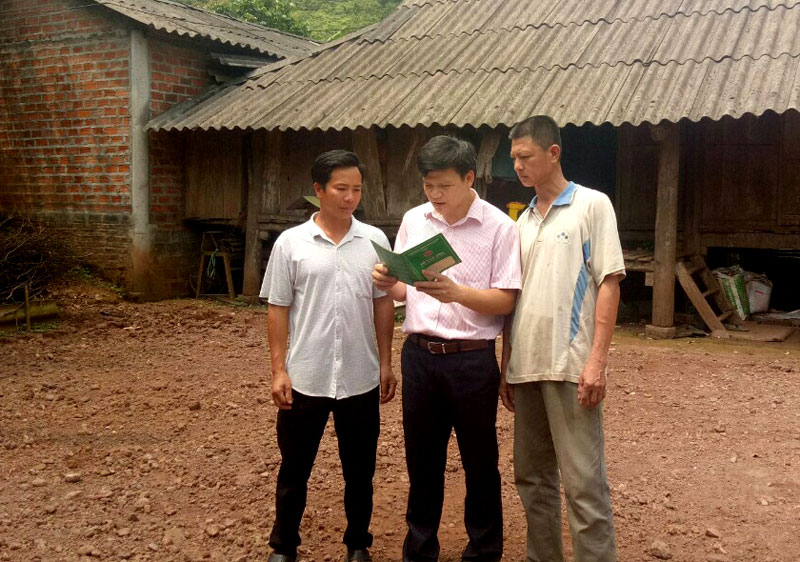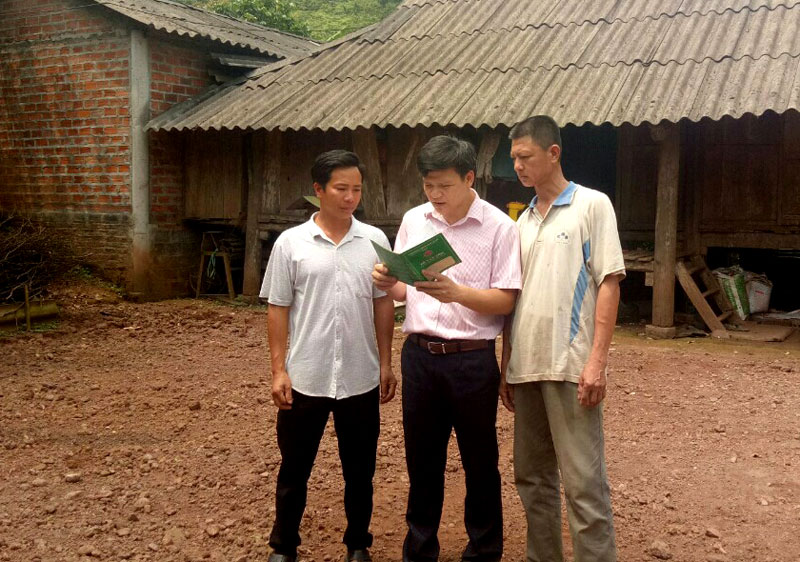
(HBO) – Yen Thuong is a remote and poor commune in Cao Phong district with its economy mainly relying on agricultural production. Through practical programmes over the past years, the district branch of the Vietnam Bank for Social Policies (VBSP) has improved the quality of credit trust activities and brought preferential credit capital to the people, thus promptly helping poor households and beneficiary families develop production, improve lives and sustainably reduce poverty in the commune.

District’s
credit officers inspect the use of loans by Bui Van Tien in Moi village, Yen
Thuong commune.
At
present, Yen Thuong commune has 13 saving and loan groups with 492 households still
in debt. The commune launched 11 policy credit programmes with loans worth over
20 billion VND. Of which, loans for poor households topped 9.2 billion VND,
benefiting 296 families. Meanwhile, 126 near-poor households recorded outstanding
loans of more than 4.6 billion VND, and 50 others borrowed upwards 1.7 billion
VND for production and trade.
In
general, borrowers used loans to the right purpose and effectively, mostly for
cattle farming, sugar cane and citrus cultivation. They generally paid
principles and interests on time. The commune also raised over 411 million VND
in saving deposits.
In
order to re-invest capital and make it easier for poor households and policy
beneficiaries to access State preferential loans, the district VBSP branch raised
public awareness of new credit programmes, enhanced loan inspection and
actively informed borrowers about due debt payment. Along with outstanding loan
growth, the branch also paid attention to improving credit quality and actively
collecting debts so that the commune recorded neither overdue debts nor
accumulated interest rates.
Chairman
of the communal People’s Committee Bui Van Dat said preferential loans for
local poor households and policy beneficiaries have proved effective,
contributing to socio-economic development and improving material and spiritual
lives. As of the late 2018, average income per capita in the locality hit 16.5
million VND, the rate of poor and near-poor households reached 38.67 percent
and 29.42 percent, respectively.
According to data from the Hoa Binh Provincial Party Committee, the industrial production index for the first six months of 2025 is estimated to have increased by 20% compared to the same period last year. This marks the highest year-on-year growth rate for this period since 2020.
In the first six months of 2025, Hoa Binh province’s export turnover was estimated at 1.145 billion USD, marking an 18.11% increase compared to the same period in 2024. Import turnover was estimated at $ 804 million, a 17.15% increase, which helped the province maintain a positive trade balance.
The lives of the ethnic minority farmers in Tan Lac district have gradually improved thanks to the new directions in agricultural production. This is a testament to the collective strength fostered through the professional associations and groups implemented by various levels of the district’s Farmers’ Union.
With the motto the "product quality comes first,” after nearly one year of establishment and operation, Muong village’s Clean Food Agricultural and Commercial Cooperative, located in Cau Hamlet, Hung Son Commune (Kim Boi district), has launched reputable, high-quality agricultural products to the market that are well-received by consumers. The products such as Muong village’s pork sausage, salt-cured chicken, and salt-cured pork hocks have gradually carved out a place in the market and they are on the path to obtaining the OCOP certification.
In the past, the phrase "bumper harvest, rock-bottom prices" was a familiar refrain for Vietnamese farmers engaged in fragmented, small-scale agriculture. But today, a new spirit is emerging across rural areas of Hoa Binh province - one of collaboration, organisation, and collective economic models that provide a stable foundation for production.
Maintaining growing area codes and packing facility codes in accordance with regulations is a mandatory requirement for agricultural products to be eligible for export. Recently, the Department of Agriculture and Environment of Hoa Binh province has intensified technical supervision of designated farming areas and packing facilities to safeguard the "green passport" that enables its products to access international markets.



